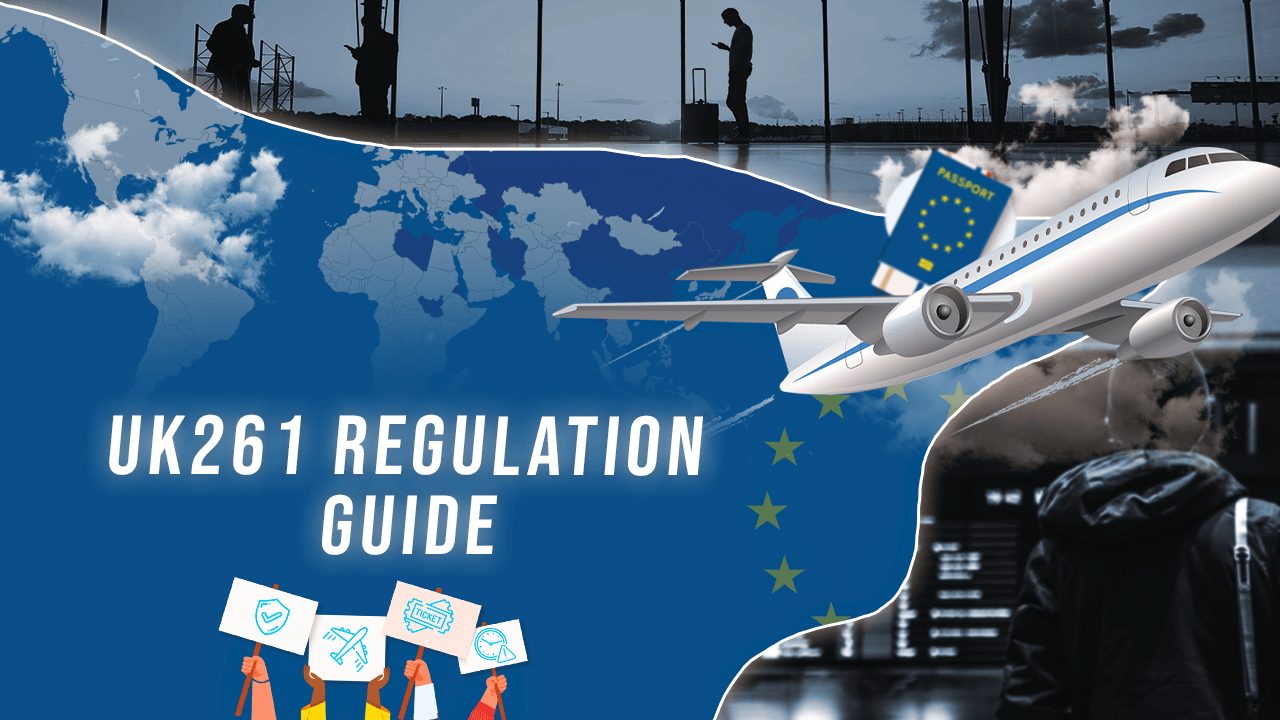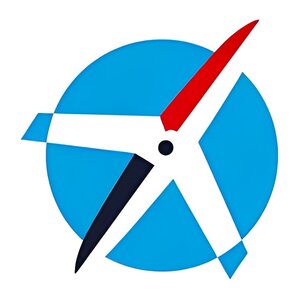Airline passenger rights in the United Kingdom and the European Union have been protected since 2004 when EU261 mandated that airlines must compensate their customers when their flights are delayed or cancelled.
After the UK broke away from the EU, people were concerned that they would lose those protections, but the UK passed the flight delay compensation rule UK261, which offers the same protections as EU261.
Our UK261 regulation guide will answer your questions about the rule, how it applies to your situation and when you qualify for a refund. You will also find out how much compensation you can expect to receive.
Definition of Regulation UK261
Regulation UK261 is essentially the same law as EU261. It simply provides protections to airline passengers on UK flights after the Brexit transition made EU261 null in the UK.
The only difference is that it applies to the UK, and if you are travelling between the UK and a country in the EU, you will be covered under two separate rules, UK261 and EU261.
You will still experience the same protection you’ve been getting since 2004 under EU261.
If you’re familiar with EU261, you already know most of what you need to know about Regulation UK261. They are essentially the same law.
UK261 Rule
The purpose of UK261 is to provide airline passengers whose flights have been delayed, cancelled, or denied boarding compensation for flight delays. Your flight delay must be a minimum of three hours to be considered for a claim.
In other words, the delay must result in you reaching your final destination more than three hours after the scheduled arrival time.
It’s also important to note that compensation can only be claimed if the delay is within the airline’s control. It includes instances where your flight was delayed or cancelled, and you were denied boarding due to overbooking.
Passenger Protection Under UK261
All passengers flying in the UK are covered under UK261 regulations.
When flying on any UK airline, you are protected under UK261, whether British Airways or easyJet. All airlines in the UK must follow the flight delay compensation rules of UK261.
Scope of UK261
The scope of UK261 includes the following:
- departures from a UK airport,
- departures from an airport in another county in the EU to the UK,
- departures from an airport in another country travelling on a UK airline.
However, if you are flying to the UK from a country outside of the UK or the EU and not flying on a UK airline, you cannot claim flight delay compensation under UK261 or EU261.
Flight compensation in the UK regulation entitles airline passengers to compensation when the airline is at fault.
Extraordinary Circumstances
It isn’t realistic to expect airlines to be able to meet deadlines under extraordinary circumstances, such as extreme weather or “acts of God.”
If an airline has done everything it reasonably could do, but circumstances outside its control caused delays, you might not be able to receive compensation.
Political unrest is another type of extraordinary circumstance that is outside the airline’s control. Regarding the rights of airline passengers, extraordinary circumstances are defined as events that are outside the airline’s control when they’ve done everything they can to prevent flight delays and cancellations.
Here is a list of items that have been deemed extraordinary in the context of flight compensation rules:
- Bad weather, including snow and fog.
- Third-party employee strikes, such as airport and air traffic control union strikes.
- Acts of terrorism and sabotage.
- Air traffic control restrictions and security issues.
- Medical emergencies.
- Natural disasters and “acts of God”.
- Collisions between a bird and an airplane.
- Manufacturing defects that the airline couldn’t have known about.
The effects of the coronavirus pandemic are another example of extraordinary circumstances that caused delays outside the airline’s control.
Flight Types
Under UK261, flights are categorized according to how far and long the flight is.
- Type 1: Flights 932 miles and under, approximately 1-2 hours.
- Type 2: Flights between 932 and 2175, or about 2-4 hours.
- Type 3: Flights greater than 2175 or longer than about 4 hours.
The compensation and entitlement protections vary according to the type of flight.
Compensation
Under UK261, flight compensation for cancellations and delays is set at fixed amounts. The longer your flight, the more you can be compensated. Your compensation will be paid to you in UK pounds.
Compensation is set at a fixed amount for delays and cancellations that meet the criteria for a claim.
- Type 1- £220
- Type 2- £350
- Type 3- £520
You can calculate your flight distance bellow.
Compensation Methods
Under UK261, the airlines can compensate you in cash or by electronic fund transfers. Airlines can also pay you by cheque, and if you sign an agreement, they are allowed to compensate you with travel or service vouchers.
Compensation Rules for Delays
When your flight is delayed, you can file a claim as long as it was due to something inside the airline’s control, such as staffing issues.
Delays caused by long airport lines do not qualify, however, because those are under the purview of the airport.
Definition of Flight Delays
A flight delay is determined by the scheduled arrival time. In the past, some airlines claimed that the arrival time was based on when the plane landed. Subsequent court cases decided that the definition is based on when the doors are opened on the plane.
The legal definition of the arrival time as the moment when the doors were opened. It is at that time that passengers are free to disembark.
Court cases also decided that connecting flights can be included in the total flight time.
Refreshments and Communication
When delays or cancellations occur, passengers are entitled to refreshments and communication from the airlines under the UK261 rule. These entitlements are scaled according to how long their flight is.
Here are the guidelines for the types of flights and the length of delays:
- Type 1 flight, delays longer than 2 hours
- Type 2 flight, delays longer than 3 hours
- Type 3 flight, delays longer than 4 hours
Accommodation
Airlines must provide accommodations for passengers when their departure time is expected on the day following the originally scheduled departure time.
Delays of More Than Five Hours
When delays exceed five hours, regardless of the type of flight, passengers can receive a full refund for their unused tickets, including any tickets that were part of their original travel plan. They may also be entitled to compensation for a flight back to their original departure point.
Has your flight been disrupted?
Don’t let disrupted flight issues cost you – get compensated up to £520!
Compensation Rules for Cancellations
Cancellations are a little different than delays, but whether you have delays or cancellations, you are protected under UK261, and the rules are similar.
The scope of cancellations is the same as it is for delays. UK261 covers cancellations of flights within the UK, no matter what airline you use.
Definition of Flight Cancellations
Regarding UK261, flight cancellations include the following circumstances:
- Your flight was cancelled before departure and moved to another departure time.
- Your flight departed but was forced to return to the airport from which it departed, and your ticket was transferred to another flight.
- Your flight departed but arrived at an airport that wasn’t your flight destination.
More Options With Flight Cancellations
The main difference between flight cancellations and delays is that you have more choices for compensation when your flight is cancelled.
When your flight is cancelled, you have the right to a full refund, and it doesn’t matter what the reason for the cancellation is. You can also choose an alternate flight, even on a different airline or at another time.
Airlines must let you choose one of these options, even when the cancellation is not their fault, making cancellations more straightforward than delays.
Obligation to Notify Passengers Within 14 Days
The airline is obligated to inform you of the cancellation before your departure. They must do this at least 14 days before you depart. If they didn’t, you could file a compensation claim.
Any replacement flight must also be on time. If the airline offers you a replacement flight that delays your travel plans by more than two hours, you can file a claim for the delay.
Cancellations 7-14 Days Before Your Departure Time
Obviously, there will be times when the airline has to cancel a flight and cannot give you 14 days’ notice.
When a cancellation of your flight happens 7-14 days before the departure date, you still have choices. You can choose to be re-routed, and if you don’t arrive at your destination within a specific time, you can file a compensation claim.
The amount of compensation varies according to how long your flight is and how long your flight was delayed. You are also eligible for compensation if your flight departs earlier than the original flight that you booked.
Compensation is set as follows:
- Type 1 flights (up to 932 miles) that depart 2 or more hours earlier are eligible for compensation of £110.
- Type 1 flights that arrive 4 or more hours late are eligible for compensation of £220.
- Type 2 flights (932 to 2175 miles) that depart 2 or more hours earlier are eligible for compensation of £175.
- Type 2 flights that arrive 4 or more hours late are eligible for compensation of £350.
- Type 3 flights (over 2175 miles) that depart 2 or more hours earlier are eligible for compensation of £260.
- Type 3 flights that arrive 4 hours late are eligible for compensation of £520.
Cancellations Less Than 7 Days Before Your Departure Time
When the airline cancels your flight with less than 7 hours notice, and you are given a replacement flight, compensation is set as follows:
- Type 1 flights that depart 1 or more hours earlier are eligible for compensation of £110.
- Type 1 flights that arrive 2 or more hours late are eligible for compensation of £220.
- Type 2 flights that depart 1 or more hours earlier are eligible for compensation of £175.
- Type 2 flights that arrive 2-3 hours late are eligible for compensation of £175.
- Type 2 flights that arrive 3 or more hours late are eligible for compensation of £350.
- Type 3 flights that depart 1 or more hours earlier are eligible for compensation of £260.
- Type 3 flights that arrive 2-4 hours late are eligible for compensation of £260.
- Type 3 flights that arrive 4 hours or more late are eligible for compensation of £520.
Compensation Rules for Connecting Flights
Sometimes, your flight delays and cancellations cause you to miss connecting flights. When this happens, the airline must refund you unless you are offered an alternate flight.
When you accept an alternate flight, you might be eligible to claim compensation if your flight is delayed. How much compensation you are eligible to receive will depend on how late you arrive at your final destination.
Additionally, it’s essential to note that it is the airline’s responsibility to provide the service you originally booked and get you to your final destination at the earliest opportunity. You can only claim compensation for flights booked on the same ticket.
Compensation Rules When You Are Denied Boarding
If your airline cannot find a seat on a booked flight, you may be entitled to compensation, accommodation, and refreshments.
When flights are overbooked, airlines must first ask if any passengers want to give up their seats in return for another benefit. If no one volunteers to take another flight, and you are denied boarding, you must be offered flight cancellation options.
Airlines Have to Prove Extraordinary Circumstances
If you file a claim that is denied due to extraordinary circumstances, you have the right to appeal. The airline has to prove that the delay was not their fault and that there was nothing they could do about it.
Even when it isn’t their fault, and there are extraordinary circumstances, an airline has to do everything it can to provide the service you paid for. They must take reasonable steps to get you to your destination on time.
Here is a list of examples of circumstances that the airline can exert some measure of control over to make sure that you reach your final destination at the scheduled time:
- Overbooked flights
- Underbooked flights
- Airline staff strikes
- Mechanical problems not caused by sabotage or hidden manufacturing defects.
If your flight is delayed or cancelled due to bad weather that affected a previous flight, you can make a claim.
How to File a Claim?
The protections that UK261 has provided to airline passengers have made airlines more responsible for providing basic services for travellers. It’s hard to imagine a time when an airline didn’t automatically offer you an alternate flight when yours was cancelled.
It can be challenging to navigate through the rules and regulations of UK261 when you need to file a flight compensation claim. Because of these challenges, hiring a flight compensation company to file your claim for you can make sense. You can find the best flight compensation companies in the UK bellow.
Flight compensation companies have the resources, expertise, and legal teams to handle your claims process. They have the know-how to help you manoeuvre through the maze of forms and hoops that you need to jump through.
While hiring a flight compensation company can certainly streamline the process, it’s important to know that you have the power to file a claim yourself too. Understanding your rights under UK261 can equip you with the knowledge to navigate the claim process independently. Though it might seem daunting, with a bit of patience and perseverance, you can advocate for yourself and potentially secure the compensation you’re entitled to. Remember, these regulations are in place to protect you, the passenger, and you have every right to enforce them personally if you choose to do so.
Starting your claim is as straightforward as filling out the UK261 compensation form available on our website. Once you’ve completed the online form with all the necessary details of your disrupted flight, the next step is to send it directly to the airline involved. It’s as simple as that. Although this process might require some patience, it’s a proactive step towards claiming the compensation you’re rightfully owed. Remember, the power to turn travel disruptions into potential payouts lies right at your fingertips!
Conclusion
In conclusion, whether you choose to employ the services of a flight compensation company or brave the path of claiming yourself, the vital thing is understanding your rights under UK261. The journey towards claiming compensation might seem complex, but armed with knowledge and patience, you can turn flight disruptions into opportunities for rightful compensation. Remember, as an air passenger, these rights are designed to protect you. So, don’t shy away from enforcing them – empower your travel experiences today!





